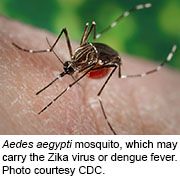- Could Your Grocery Store Meat Be Causing Recurring UTIs?
- Are You Making This Expensive Thermostat Error This Winter?
- Recognizing the Signs of Hypothyroidism
- 10 Strategies to Overcome Insomnia
- Could Artificial Sweeteners Be Aging the Brain Faster?
- Techniques for Soothing Your Nervous System
- Does the Water in Your House Smell Funny? Here’s Why
- Can a Daily Dose of Apple Cider Vinegar Actually Aid Weight Loss?
- 6 Health Beverages That Can Actually Spike Your Blood Sugar
- Treatment Options for Social Anxiety Disorder
Mosquito-Borne Illnesses May Not Be Limited to Tropics

Mosquito-borne illnesses like Zika, dengue and chikungunya can be spread in cooler temperatures than previously thought, researchers say.
Based on data from Latin America and the Caribbean, transmission of the illnesses is highest at about 84 degrees Fahrenheit. Experts had long believed that 90 degrees F was their peak-transmission temperature.
The findings could prove important as climate change causes temperatures to climb, the study authors said.
“This means that future transmission is much more likely to occur in subtropical and even temperate areas, such as the southern United States and northern Mexico,” study co-author Jeremy Cohen said in a University of South Florida news release. He is a postdoctoral researcher studying integrative biology at USF.
Study co-author Jason Rohr, an associate professor of integrative biology at USF, said the findings could help identify areas at greatest risk of outbreaks.
Air temperature affects how often mosquitoes bite, how long it takes for them to ingest a virus from one human and inject it into another, as well as their life cycle.
“Given that the predominant thinking was that transmission was most likely to peak at very hot temperatures, which would mostly limit the diseases to the tropics, we were certainly surprised that the model and the field data suggested that high rates of transmission could occur at lower temperatures, possibly impacting more northern regions in the future,” Cohen said.
The study was published recently in the journal PLoS Neglected Tropical Diseases.
More information
The World Health Organization has more on mosquito-borne diseases.
Source: HealthDay
Copyright © 2026 HealthDay. All rights reserved.










